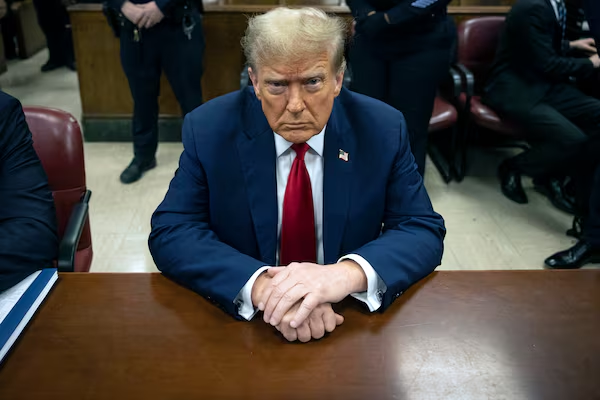Donald Trump eases tariffs on Canada and Mexico amid market turmoil

Donald Trump eases tariffs on Canada and Mexico amid market turmoil! US President Donald Trump has signed orders expanding exemptions on tariffs imposed this week on Canada and Mexico, rolling back some of his controversial trade measures.
This marks the second time in two days that Trump has revised his trade policies, which have caused uncertainty for businesses and unrest in financial markets.
On Wednesday, Trump temporarily spared car manufacturers from 25% import levies, just a day after they took effect.
Reactions from Canada and Mexico
The policy shift has drawn mixed reactions.
Mexican President Claudia Sheinbaum expressed gratitude, calling it a “positive step” toward maintaining trade relations.
In response, Canada’s finance minister stated that the country would hold off on its second round of retaliatory tariffs against US goods.
Donald Trump eases tariffs

However, Canadian Prime Minister Justin Trudeau hinted that the trade dispute was far from over.
“Our goal remains to get these tariffs—all tariffs—removed,” he said, emphasizing that the trade war between the two allies was likely to continue.
Trudeau also revealed that his latest phone conversation with Trump regarding tariffs had been “colourful,” with Trump reportedly using profane language multiple times.
Tariff Exemptions and Adjustments
The carveout from the new import duties applies to goods traded under the US-Mexico-Canada Agreement (USMCA), a deal that Trump initially signed during his first term.
According to trade analysts, items that currently qualify for tariff exemptions under the USMCA include:
- Televisions
- Air conditioners
- Avocados
- Beef
Additionally, the tariffs on potash—a crucial fertilizer ingredient used by US farmers—have been reduced from 25% to 10%.

Despite these adjustments, a White House official revealed that:
- 50% of imports from Mexico
- 62% of imports from Canada
may still face tariffs. These figures could fluctuate as businesses adapt to the new trade policies.
Meanwhile, the White House has doubled down on plans to expand tariffs globally. Officials have scheduled an April 2 announcement outlining new “reciprocal” trade duties on several international trade partners.
Market and Economic Impact
The ongoing trade war has sent shockwaves through financial markets, leading to increased volatility.
On Thursday, the S&P 500 index—which tracks the performance of major American companies—dropped nearly 1.8%, reflecting growing investor concerns.
George Godber, a fund manager at Polar Capital, criticized Trump’s unpredictable trade policies, calling them a “hokey cokey” approach that has made business planning nearly impossible.
“This back-and-forth with tariffs is putting immense pressure on the US economy,” Godber said.
At the same time, European markets have responded more positively, particularly in Germany, which has been actively preparing countermeasures against Trump’s trade actions.
Trump Dismisses Market Concerns
Despite market turbulence, Trump dismissed suggestions that he was revising tariffs due to stock market fears.
“Nothing to do with the market,” he stated. “I’m not even looking at the market, because long-term, the United States will be very strong with what’s happening.”
Strong Words from Canada
Ontario Premier Doug Ford remained skeptical about Trump’s latest policy reversals, calling them insignificant.
“A pause on some tariffs means nothing,” Ford stated.
Earlier, Ford announced plans to impose a 25% tariff on electricity exports to New York, Michigan, and Minnesota—a move that could impact 1.5 million homes and businesses.
“Honestly, it really bothers me. We have to do this, but I don’t want to,” Ford said.
Treasury Secretary Sparks Controversy
US Treasury Secretary Scott Bessent ignited further tensions when he mocked Trudeau, suggesting that Canada’s retaliation efforts were counterproductive.
“If you want to be a numbskull like Justin Trudeau and say, ‘Oh, we’re going to do this,’ then tariffs are probably going to go up, not down,” Bessent said during a speech at the Economic Club of New York.

USMCA and the Deeply Integrated Trade Network
For decades, the US, Canada, and Mexico have maintained deeply integrated economies through free trade agreements.
Each day, billions of dollars in goods cross the three countries’ borders. According to trade expert Daniel Anthony, $1 billion worth of goods enter the US from Mexico and Canada daily without duty-free exemptions, due to historically low tariffs.
“Whether importers can or will start claiming USMCA exemptions remains to be seen, but there’s a huge amount of money at stake,” Anthony said.
Disruptions in US Supply Chains
The effects of Trump’s tariffs are already rippling through the US economy.
In January, imports spiked, as businesses rushed to secure goods before higher tariffs took effect. As a result, the US trade deficit surged 34%, exceeding $130 billion, according to the Commerce Department.
Gregory Brown, CEO of BenLee Trailers, said his company has had to adjust prices multiple times over the past five weeks due to fluctuating trade policies.
Trump’s administration has also expanded tariffs on steel and aluminum, further increasing cost pressures on manufacturers.
A Business-Friendly President?
Despite these challenges, Brown remains optimistic, saying businesses have so far adapted to price changes.
“For now, our customers are willing to pay higher prices,” Brown said, adding that the economy remains strong.
He also noted that economic growth under Biden was robust and suggested that Trump’s willingness to revise tariffs signals a business-friendly president adjusting to reality.
“Trump is a businessman. He’s making course corrections based on business realities,” Brown said.
What’s Next?
As Trump’s trade policies continue to evolve, businesses and governments will need to closely monitor further tariff adjustments.
With an April 2 tariff announcement looming, financial markets and global trade partners remain on edge, awaiting Trump’s next move.
For now, the US, Canada, and Mexico remain locked in a trade battle—one that is far from over.













